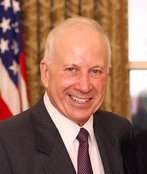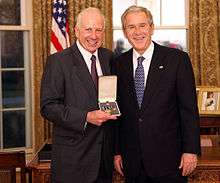Samuel J. Heyman
| Samuel Heyman | |
|---|---|
 | |
| Born |
March 1, 1939 Danbury, Connecticut, USA |
| Died |
November 7, 2009 (aged 70) New York City, New York, USA |
| Residence | Westport, Connecticut |
| Nationality | United States |
| Alma mater |
Yale College Harvard Law School |
| Occupation | Businessman, philanthropist |
| Religion | Judaism |
| Spouse(s) | Ronnie Feuerstein |
| Children |
Lazarus Heyman Eleanor Heyman Propp Jennifer Heyman Millstone Elizabeth Heyman Winter |
Samuel J. Heyman (March 1, 1939 – November 7, 2009) was an American businessman, hedge fund manager, and philanthropist best known for his longtime chairmanship of the GAF Materials Corporation and International Specialty Products.
Early life and family
Heyman was born in Danbury, Connecticut to Lazarus and Annette Heyman. His father was a real estate developer.[1]
As an undergraduate at Yale College, Heyman was a regionally ranked varsity tennis player and member of Phi Beta Kappa.[2] After graduating from Yale in 1960, he attended Harvard Law School, graduating in 1963.[3] After graduation, he became an attorney for the US Department of Justice during the Kennedy Administration, rising to become Chief Assistant United States Attorney for Connecticut. In 1968, after the death of his father, he took over his family's Connecticut-based real estate firm, Heyman Properties. Under his leadership, the company became one of New England's largest commercial real estate developers.
Heyman married his wife, Ronnie Feuerstein Heyman, in 1970. Together, they had four children and nine grandchildren. His daughter Eleanor married real estate investor Rodney Propp; they have since divorced.[4][5][6] Heyman and his wife owned a large collection of modern art, including works by Alberto Giacometti, Jackson Pollock, and Mark Rothko. He was a member of the Fifth Avenue Synagogue.[7]
Business career
In 1982, Heyman, a major investor in the GAF Materials Corporation (then called GAF Corporation), pursued the chairmanship of the then-troubled chemical and roofing materials producer. Rebuffed, he launched a proxy fight against the company's management that ended with shareholders voting to oust the board and install Heyman as CEO and chairman. At the time, Barron's called this development "one of the most striking achievements in the annals of corporate finance."[8]
Within a year of Heyman's takeover, GAF's performance quickly improved thanks to a major cost-cutting initiative and increased research and development outlays.[9] Today, it is the largest supplier of residential roofing materials in North America. In 1987, Heyman took GAF private despite an initial rebuff from shareholders.[10]
During the late 1980s, Heyman attempted hostile takeovers of Union Carbide and Borg-Warner in an effort to increase the scale of GAF's chemical operations. Despite the failures of these takeovers, they resulted in large profits for GAF through its sales of stock in the targeted firms. Many of Heyman's takeover attempts were funded with debt from Drexel Burnham Lambert and Chase Manhattan Bank. In 1989, Heyman took GAF private through a leveraged buyout.
Two years later, Heyman spun off GAF's chemical business into a separate company, International Specialty Products. He spent much of the 1990s with the day-to-day chairmanship of the company as his primary business focus. In the late 1990s, GAF faced lawsuits related to its former asbestos business. Heyman unsuccessfully lobbied Congress to change the law governing asbestos litigation and eliminate punitive damages.[11]
Heyman returned to corporate takeovers in 2000, when he was involved in unsuccessful takeover attempts on Dexter Chemical Corporation, the London Stock Exchange, and Hercules Corporation.[12] In 2007, during Airline Partners Australia's attempted takeover of Qantas, his hedge fund, Heyman Investment Associates[13] declined to accept Airline Partners Australia's offer for his shares in the airline. Much of the bidding team blamed Heyman for the takeover's ultimate failure.[14]
Charity work

Heyman had a diverse array of philanthropic interests. Most notably, he founded and served as chairman of the Washington-based Partnership for Public Service, a nonprofit that encourages undergraduates to pursue careers in public service. He endowed the Heyman Fellowship Program at Harvard Law School, Yale Law School, Columbia Law School, and Seton Hall School of Law to assist graduates with careers in federal government.[15] He also established The Samuel and Ronnie Heyman Center on Corporate Governance at the Benjamin N. Cardozo School of Law. Heyman won the Presidential Citizens Medal in 2008 for his charity work.
Samuel Heyman died on November 7, 2009 at age 70 due to complications from open heart surgery.
References
- ↑ Fabrikant, Geraldine (2009-11-09). "Samuel Heyman, a Corporate Raider, Dies at 70". The New York Times. Retrieved 2009-11-11.
- ↑ "Westport Businessman Samuel J. Heyman Dies at 70". Westport Now. 2009-11-08. Retrieved 2009-11-11.
- ↑ "The Art of Selling Government Service". Harvard Law School. Spring 2005. Retrieved 2009-11-11.
- ↑ Martha Stewert Weddings: "A Modern and Formal White Wedding in Connecticut" retrieved December 23, 2013
- ↑ New York Times: "Samuel Heyman, a Corporate Raider, Dies at 70" By GERALDINE FABRIKANT" November 8, 2009
- ↑ Gotham Magazine: "Upper West Side Celebrity Real Estate News" by sally goldstein retrieved December 23, 2013
- ↑ Harvard Law Today: "Samuel J. Heyman ’63 [1939—2009"] November 9, 2009
- ↑ "Samuel J. Heyman '63 [1939—2009]". Harvard Law School. 2009-11-09. Retrieved 2009-11-11.
- ↑ "GAF Corporation". Funding Universe. Retrieved 2009-11-11.
- ↑ "COMPANY NEWS; Heyman Gets Rebuff at GAF". The New York Times. 1987-10-16. Retrieved 2009-11-11.
- ↑ Miller, Stephen (2009-11-10). "Takeover Ace Took Home the Spoils". The Wall Street Journal. Retrieved 2009-11-11.
- ↑ Donovan, Doug (2000-11-27). "Do as I Say, Not as I Do". Forbes. Retrieved 2009-11-11.
- ↑ Hawthorne, Mark (2007-05-08). "Heyman sails close to the edge, then over it". The Age. Retrieved 2009-11-11.
- ↑ Hewett, Jennifer (2007-05-07). "Giant bluff goes badly wrong, no hedging it". The Australian. Retrieved 2009-11-11.
- ↑ "Heyman Fellowship Program". Harvard Law School. Retrieved 4 May 2011.